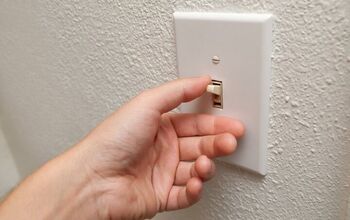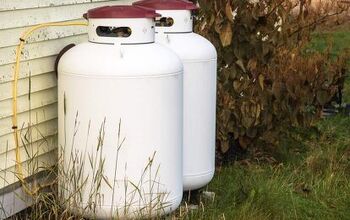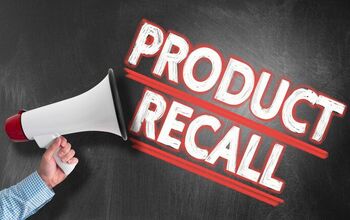What Kind Of Gas Does A Leaf Blower Use? (Find Out Now!)

Using any type of gas-powered equipment should be done with caution. A leaf blower is no exception to this rule. It’s important to know the type of gas required so you don’t damage the leaf blower or injure yourself.
All leaf blowers, whether containing 2- or 4-cycle engines, require a mixture of gas and oil. This is not simply motor oil but special oil designed to mix with the gas. Most leaf blower manufacturers suggest using regular unleaded gas. The usual recommendation is 87 octane gas or up with a 10 percent or less ethanol blend. Ethanol-free is even better.
Do You Need Lawn and Tree Maintenace Pros?
Get free, zero-commitment quotes from pro contractors near you.

Gas to Oil Ratio
In gas-powered leaf blowers, the ratio of gas to oil is usually 40:1. This means the mixture contains about 3.2 ounces of 2-cycle engine oil and one gallon of gas. Your manual can give you the exact ratio.
A 2-cycle engine needs the oil in the fuel mixture so that the engine can stay lubricated. However, regular engine oil is too thick and should not be included in the mixture. Instead, you should use 2-cycle or 4-cycle oil, depending on the engine you have.
2-Cycle vs. 4-Cycle
While most leaf blowers are equipped with a 2-cycle engine, some have a 4-cycle engine. Both types of engines need lubrication so the engine won’t seize, but the oil they take and how it’s incorporated with the gas differs.
2-cycle engines are simpler. So, the oil is mixed directly with the gas because there isn’t a separate circulation system. The oil and gas burn in the combustion chamber at the same time.
The oil in 4-cycle engines is added to a separate port and not mixed directly with the gas. 4-cycle engines have a circulating pump that keeps the oil moving while in use. The oil gets returned to the crankcase and is recycled. While you shouldn’t have to add oil every time, it should be replaced occasionally because it gets contaminated over time.
The Difference in Oils
2-cycle oil must be more refined than 4-cycle oil since it burns with the gas. It must contain additives such as the following:
- Detergent – to clean carbon deposits and varnishes from combustion port
- Anti-wear agents – to safeguard moving parts
- Biodegradability components
- Antioxidants
There are additives in 4-cycle oils as well, though they are different because this oil isn’t designed to burn.
You should never use 2-cycle oil in a 4-cycle engine or vice versa. Mixing 4-cycle oil with gas in a 2-cycle engine can significantly damage the engine and shorten its life. Similarly, 2-cycle oil is too thin to be used in a 4-cycle engine which could cause damage due to improper lubrication.
How to Mix Gas and Oil
As mentioned before, if your leaf blower has a 2-cycle engine, the gas and oil need to be mixed together before filling the blower. Your manual will tell you the exact ratio of gas to oil if you’re unsure.
You want to do your best to get it exact, but it’s always better to overestimate the oil amount. Overestimating the oil will not cause harm to the engine. Underestimating, however, will not allow for proper lubrication.
You can fill a canister with regular, unleaded gas right from the station. If you choose to, it won’t hurt to upgrade to premium gas. The higher the quality of the gas the better the engine will run.
Once you’ve got the gas, add the oil and give it a good shake. Then, you’re ready to fill up! Make sure to shake the mixture immediately before you put it in the leaf blower. After a while of sitting, the oil will eventually separate from the gas.
Proper Care for Engine and Fuel
If you’ve determined you won’t be using your leaf blower for a period of time, it’s best to empty the gas tank. Make sure to seal it tightly. If the oil and gas mixture is left in the tank, it can become gummy and cause problems with the machine’s functions.
If you have leftover oil and gas in your canister and are done using the blower for the season, you should discard it. Your leaf blower needs the freshest fuel possible with each use. This will ensure the engine continues to run properly over time.
Related Questions
What happens if I don’t mix the gas with oil?
Because the engine won’t be properly lubricated, it will seize in a matter of seconds. You’ll hear an awful noise and the blower will shut down. At that point, it needs to be looked at by a professional. Most likely, you’ll need a completely new leaf blower.
Does premium gas last longer?
Unfortunately, the answer here is no. Premium gas does not last any longer than regular, unleaded gas. The major benefit of using premium gas in your leaf blower is that it contains a higher octane level. This will make the engine run more smoothly.
Should you use ethanol-free gas in small engines?
Gas mixed with 10 percent ethanol is approved for small engines. But it has its downfalls. The 2-cycle oil stays bonded to the gas but separates from the ethanol after sitting in the tank for a while. Therefore, the ethanol and water parts contain no oil for lubrication.If you choose to use gas with ethanol, it must be no higher than 10 percent. And you must change the fuel every 2-3 weeks to utilize its best performance.
Do You Need Lawn and Tree Maintenace Pros?
Get free, zero-commitment quotes from pro contractors near you.

Summing It Up
Leaf blowers are able to take regular, unleaded gas, but it must be mixed with specially designed oil. If oil is not mixed with the gas, you run the risk of damaging the engine or shortening the life of your leaf blower.
For a 2-cycle engine, you need 2-cycle oil to be mixed directly with the gas. For a 4-cycle engine, you need 4-cycle oil to be added to a separate chamber in the leaf blower.
Premium gas can also be used and will allow the engine to run better. But whatever fuel you choose, make sure it’s the freshest possible for each use.

Brigid Levi is a wife, mother, and freelance writer who enjoys a good DIY project and creating beautiful spaces within her home. From cleaning and organization hacks to home decor ideas, she loves helping people in their quest to turn a house into a home. Her hobbies include pretending to be Joanna Gaines while updating her home with her husband and performing in local theater productions.
More by Brigid Levi



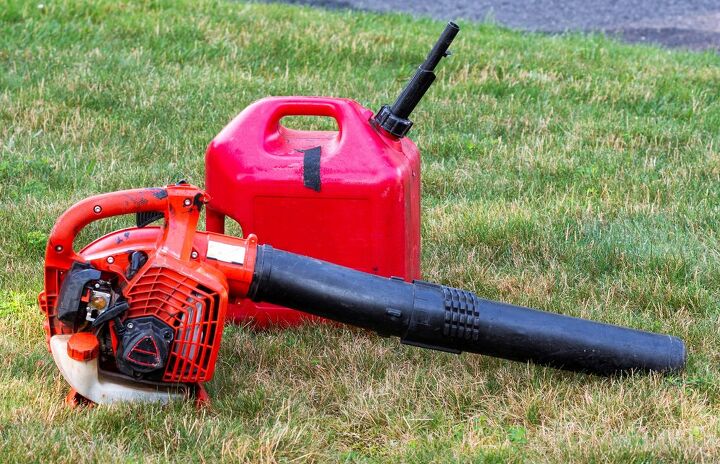






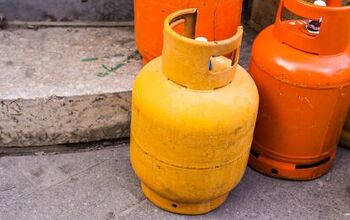



![10 Best Electric Lawn Mowers - [2022 Reviews & Top Rated Models]](https://cdn-fastly.upgradedhome.com/media/2023/07/31/9070486/10-best-electric-lawn-mowers-2022-reviews-top-rated-models.jpg?size=350x220)



